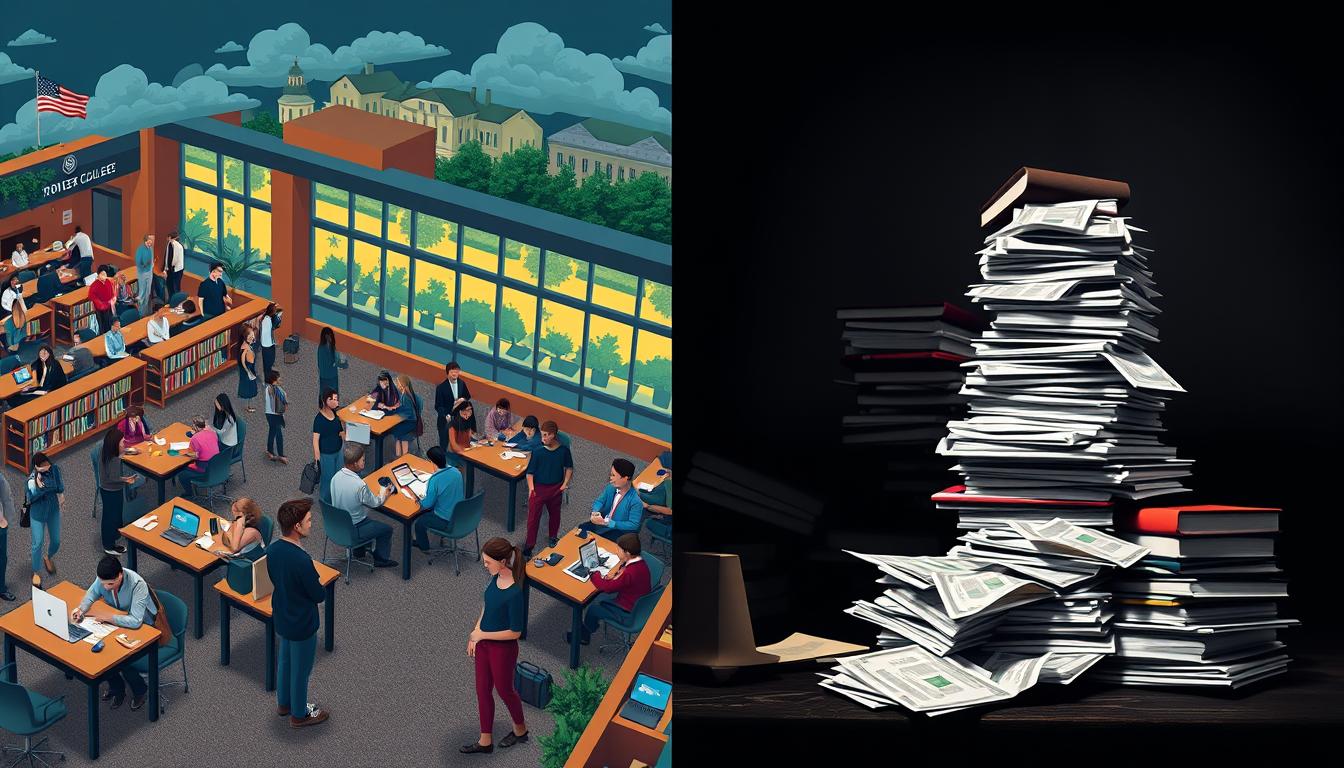In today’s fast-paced world, the decision to pursue higher education is more complex than ever. As a prospective student, you likely feel the weight of the college decision pressing down on your shoulders. With so many avenues available—such as vocational training and online courses—the choice between a traditional four-year degree and alternative educational paths can leave you perplexed. It is crucial to weigh the pros and cons of going to college before making such a significant commit.
One of the most appealing aspects of enrolling in college is its clear correlation with improved career prospects. Statistics show that college graduates can earn a wage premium of about 25% within a year of graduation compared to those without a degree, according to a study by the Burning Glass Institute. Not only does a degree often translate into a higher starting salary, but it also provides access to professional roles in fields like business and engineering, where rapid skill acquisition is valued.
However, the allure of higher earning potential is tempered by the reality of higher education costs. While in-state public universities may charge an average tuition of $9,377 per year, private institutions can skyrocket to an average of $39,400 annually. The financial implications of student debt can weigh heavily on your shoulders even after graduation—especially considering that over the past four decades, graduates have seen a drop in salary adjusted for inflation.
As you navigate this pivotal stage, it’s essential to also compare these financial considerations with your personal career goals. Are you looking for a hands-on career that might only require a two-year degree? Many industries such as healthcare and technology increasingly value skills over formal education credentials. Therefore, delving into alternative options, such as community colleges, offers a more flexible and cost-effective route to gaining essential skills without committing to years of study.
Ultimately, the decision to attend college should align with your aspirations, financial situation, and the reality of job market trends. As you read through this article, you will gain a comprehensive overview of both the advantages and disadvantages of going to college, equipping you with the knowledge you need to make a well-informed choice. Prepare to explore the nuances of higher education as you consider where your educational journey might lead you.
Understanding the College Decision
The college decision is crucial in shaping your future. Taking the time to evaluate your personal interests and career aspirations will help in making an informed choice. Assessing your career goals can clarify whether attending college is necessary or if alternative education paths such as vocational training or online degrees would be more appropriate.
The Importance of Assessing Your Career Goals
Determining your career prospects should be a primary focus when considering higher education. Research the educational requirements of your desired profession. Some fields require a traditional college degree, while others may accept vocational training or even online degrees. Understanding this distinction can save you from unnecessary student debt.
Evaluating Higher Education Costs
Financial considerations play a significant role in the college decision process. With rising higher education costs, it is essential to evaluate both the direct costs, like tuition and fees, and the indirect costs, such as lost income while studying. Weighing these factors helps to determine if the potential ROI justifies the expense of attendance.
Exploring Alternative Education Paths
Alternative education paths can provide valuable opportunities without the burdensome costs associated with traditional college. Options such as vocational training and online degrees allow for quicker entry into the workforce and can lead to fulfilling careers. Exploring these options ensures you make a choice that aligns with your financial situation and career ambitions.
| Education Path | Typical Duration | Average Cost | Job Placement Rate |
|---|---|---|---|
| Traditional College | 4 years | ~ $100,000 | ~ 32% |
| Community College | 2 years | ~ $15,000 | ~ 50% (for transfers) |
| Vocational Training | 6 months – 2 years | ~ $30,000 | ~ 70% |
| Online Degrees | Varies | ~ $25,000 | ~ 60% |
Pros and Cons of Going to College
Deciding whether to pursue a college education involves weighing both advantages and disadvantages. This decision can significantly influence your career prospects and overall quality of life. Understanding these factors can guide you in making an informed choice.
Advantages of Attending College
Attending college offers numerous advantages that can positively impact your future. One prominent benefit is the potential for improved career prospects. Statistics indicate that individuals with a bachelor’s degree earn significantly more than those with only a high school diploma. In fact, college graduates earn approximately $30,576 more per year, contributing to a much higher lifetime earning potential.
Skill development is another key advantage of college. Students acquire essential competencies, such as critical thinking and communication, which are highly valued in the job market. Networking opportunities presented during college can lead to connections that facilitate career advancement and help you stand out to employers.

Disadvantages of Attending College
Despite the appealing advantages, there are notable disadvantages of attending college that deserve consideration. The burden of student debt can weigh heavily on graduates, with the average debt for obtaining a bachelor’s degree reaching $30,000. This financial strain complicates graduates’ future financial outlook and can limit their ability to make significant life choices, such as purchasing a home or saving for retirement.
Dropout rates pose another concern, as approximately 32.9% of college students do not complete their degree programs. Many students face challenges that lead to underemployment after graduation, reflected in a rate of 40.5% for recent graduates who work in positions not commensurate with their education level. Additionally, the opportunity cost of attending college—time spent in education instead of gaining work experience—can impact your overall career trajectory.
| Factors | Advantages | Disadvantages |
|---|---|---|
| Earnings Potential | College graduates earn $30,576 more per year | Average student loan debt of $30,000 |
| Career Opportunities | Access to a wider variety of job options | 40.5% underemployment rate for recent graduates |
| Skill Development | Gains in critical thinking and communication | 32.9% dropout rate each year |
| Networking | Professional connections can enhance career advancement | Time spent in education can delay earning income |
Financial Considerations
When considering your college decision, understanding financial implications is crucial. Numerous factors can impact your experience, including student debt, tuition costs, and potential earnings after graduation.
Understanding Student Debt Statistics
Current statistics reveal alarming trends in student debt, affecting many graduates’ life choices. The average student loan debt for American college graduates stands at approximately $37,700. This staggering figure contributes to over 50% of students dropping out of public universities due to financial constraints. Furthermore, 79% of students report delaying graduation, often needing to switch to part-time status to manage their financial responsibilities. The emotional toll is evident, with 73% of individuals in the U.S. citing finances as their primary stressor.
Exploring Financial Aid and Scholarship Opportunities
Finding ways to alleviate the burden of higher education costs is essential. Various financial aid options, including grants, scholarships, and work-study programs, can significantly reduce the overall expense of college. Students actively seeking scholarship opportunities often discover substantial funding that lessens their debt burden, sometimes allowing them to graduate debt-free. Understanding the application process for these financial resources can enhance your college experience and shape your future career prospects.
ROI of College Education: Is It Worth It?
Evaluating the return on investment (ROI) of a college education requires careful consideration. Analysts highlight a reliable income gap between those with college degrees and high school diploma holders, revealing that higher education can lead to increased earning potential over a lifetime. While the financial considerations of attending college may seem daunting, many graduates experience significant career advancement and salary increases. The implications of financial choices made during your educational journey will inevitably influence both your personal and professional life.

Conclusion
In assessing your college decision, it’s essential to grasp the pros and cons of going to college effectively. The financial statistics highlight that college graduates typically earn significantly more over their lifetimes, with an expected $1 million more compared to those without a degree. Furthermore, college education is correlated with lower unemployment rates and greater job security, reflecting the vast demand for higher education in today’s job market.
Each individual’s case will differ. Your personal career aspirations, financial situation, and available education alternatives must weigh heavily in your decision. With average costs approaching $10,740 for in-state public colleges, it’s crucial to evaluate potential student debt against future earning capabilities. Remember, the uncertainty surrounding individual fortuity in obtaining financial stability through college should further provoke thoughtful consideration.
By weighing these critical factors, you can make a well-informed choice that aligns with your goals and life circumstances. Whether you choose to pursue traditional higher education pathways or explore alternative routes, understanding your options will empower you to navigate the complexities of the college landscape effectively.

